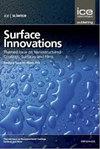Bio-inspired microgroove arrays with drag reduction and hydrophobic properties
IF 3.5
4区 材料科学
Q3 CHEMISTRY, PHYSICAL
引用次数: 1
Abstract
Reducing energy consumption is one of the most effective ways to solve the problem of energy shortage. In this work, the nature-inspired paint microgroove arrays with different periods were fabricated using a one-step laser ablation method. The wind tunnel experiment was performed at two wind speeds 27.7 m/s and 33. m/s to collect the drag force data on smooth and structured paint coatings. The results shown that the microgroove arrays oriented perpendicular to the flow direction were beneficial to drag reduction, and the drag reduction rate of up to 7.2% was obtained. Meanwhile, the microgroove arrays induced by laser ablation changes the wettability of paint surface to hydrophobicity. The contact angle (CA) shows a slightly decrease trend with the increase of the periodic scale. Besides, the anticorrosion properties of these microgrooves make them advantageous in harsh environments. The fabricated drag-reducing paint microstructures, with the features of self-cleaning and durability, have the potential to be applied on vehicles to realize speed improvement and energy saving.具有减阻和疏水特性的仿生微槽阵列
降低能源消耗是解决能源短缺问题的最有效方法之一。在这项工作中,使用一步激光烧蚀方法制造了不同周期的受自然启发的油漆微槽阵列。风洞实验在两种风速27.7下进行 m/s和33。 m/s,以收集光滑和结构化油漆涂层的阻力数据。结果表明,垂直于流动方向的微槽阵列有利于减阻,减阻率高达7.2%。同时,激光烧蚀引起的微槽阵列使涂料表面的润湿性变为疏水性。随着周期尺度的增大,接触角(CA)呈现出略微减小的趋势。此外,这些微槽的防腐性能使其在恶劣环境中具有优势。制造的减阻涂料微结构具有自清洁和耐久性的特点,有潜力应用于车辆上,以实现速度提高和节能。
本文章由计算机程序翻译,如有差异,请以英文原文为准。
求助全文
约1分钟内获得全文
求助全文
来源期刊

Surface Innovations
CHEMISTRY, PHYSICALMATERIALS SCIENCE, COAT-MATERIALS SCIENCE, COATINGS & FILMS
CiteScore
5.80
自引率
22.90%
发文量
66
期刊介绍:
The material innovations on surfaces, combined with understanding and manipulation of physics and chemistry of functional surfaces and coatings, have exploded in the past decade at an incredibly rapid pace.
Superhydrophobicity, superhydrophlicity, self-cleaning, self-healing, anti-fouling, anti-bacterial, etc., have become important fundamental topics of surface science research community driven by curiosity of physics, chemistry, and biology of interaction phenomenon at surfaces and their enormous potential in practical applications. Materials having controlled-functionality surfaces and coatings are important to the manufacturing of new products for environmental control, liquid manipulation, nanotechnological advances, biomedical engineering, pharmacy, biotechnology, and many others, and are part of the most promising technological innovations of the twenty-first century.
 求助内容:
求助内容: 应助结果提醒方式:
应助结果提醒方式:


